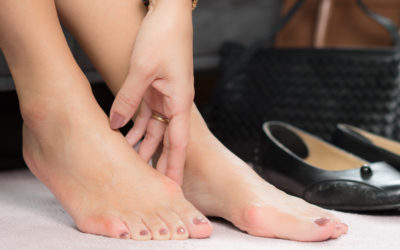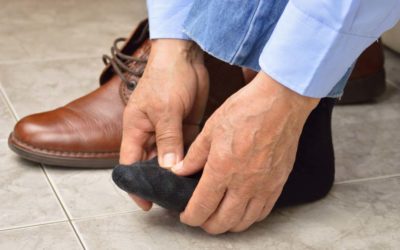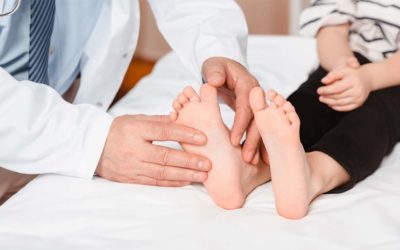Ankle Fusion
If you have degenerative arthritis in your ankle, normally as a result of an ankle fracture, or a severe deformity of your ankle, your podiatrist may recommend a total ankle replacement or ankle fusion as the next step to relieve your pain.
Historically, when someone suffered from ankle arthritis, their only choice was an ankle fusion, a surgery to fuse bones in the ankle together. This surgery is successful in elimination of pain, but it also limits motion.
During an ankle fusion, Chad D. Brady, DPM, FACFAS removes the articular cartilage separating the tibia or shinbone and the talus, the small bone connecting the tibia to the heel bone, to make the two bones grow together. Cuts are made in both areas so that the foot is at a right angle to the lower leg. Then the bones are held together with the use of metal plates and screws inserted under the skin while the body fuses these bones together. Ankle fusion can be done arthroscopically with minimal incisions and a small camera inserted into the joint.
After your surgery, Dr. Brady will wrap your ankle in a padded plaster cast. The cast will be replaced after two weeks with a short-leg cast. No weight should be placed on your foot until your podiatrist is sure the bones are fusing, usually an eight to twelve week period. Dr. Brady will schedule frequent X-rays to determine if the bones are fusing and once confirmed, an ankle brace will replace the cast.
Your surgery team will discuss with you all follow up details. While you will not be able to run normally after ankle fusion surgery, you will be able to walk with a natural gait following physical therapy and shoe modifications.
Evanston Regional Hospital is also proud to offer total ankle replacement as an alternative to ankle fusion. A total ankle replacement also eliminates pain but preserves motion. However, not everyone is a candidate for total ankle replacements.
Talk with board-certified podiatrist Chad D. Brady, DPM FACFAS about whether an ankle fusion or total ankle replacement is right for you. Schedule a consultation at www.EvanstonAnytime.com or call 307-789-9355 (WELL).
Appointments and referrals
Call 307-789-9355
Related Services and Conditions
Foot and Ankle Surgery
At Evanston Regional Hospital, we understand how debilitating a foot or ankle problem can be. Whether the condition is chronic or acute, if your mobility is compromised because of pain, you should find out what kind of relief is available through a Podiatrist....
Ankle and Foot Trauma
When hiking in the summer, stepping off the porch, or walking over ice, a wrong step can unfortunately, quickly turn into a broken ankle or foot. Trauma like this to the bones, tendons and ligaments can result in pain and inflammation as well as difficulty walking and...
Bunion Surgery
At Evanston Regional Hospital we know how much bunions can hurt. Even putting on shoes can become difficult, let alone walking comfortably or doing the things you love. A board-certified podiatrist is here to help. We specialize in bunion surgery (bunionectomy), an...
Hammertoe Correction Surgery
When you’re dealing with hammertoe, every step can hurt. The condition, in which the toe becomes abnormally bent, can also affect your balance and lead to other foot problems without proper care. At Evanston Regional Hospital, we can help you find relief. The...
Neuroma
Can you image pain in your foot with every step? Neuroma is a condition that brings on pain, a burning sensation, tingling, or numbness between the toes and in the ball of the foot. Also referred to as a “pinched nerve," it is actually a benign growth of nerve tissue...
Pediatric Flatfoot
Flatfoot is common condition defined by the partial or total collapse of the arch. When a child has pediatric flatfoot, the arch of the foot shrinks or disappears when he or she stands. In addition, parents may notice awkwardness or clumsiness in walking, difficulty...
Wound Debridement for Diabetes
If you’re living with diabetes, you may be prone to foot problems—including frequent wounds. Getting immediate care for this issue is crucial to preventing or stopping infection and other serious complications, including limb loss. At Evanston Regional Hospital, we...







